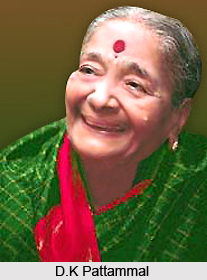 D. K. Pattammal, also known as Damal Krishnaswamy Pattammal, was a distinguished Carnatic musician as well as playback singer for film songs in several Indian languages. She had been considered amongst the most popular and esteemed Carnatic musicians. Damal Krishnaswamy Pattammal had been reckoned as one amongst the `female trinity of Carnatic music`, along with M. S. Subbulakshmi and M. L. Vasanthakumari as the others. The entry of women into the realm of Carnatic music has been made possible through of the endless effort of this trio.
D. K. Pattammal, also known as Damal Krishnaswamy Pattammal, was a distinguished Carnatic musician as well as playback singer for film songs in several Indian languages. She had been considered amongst the most popular and esteemed Carnatic musicians. Damal Krishnaswamy Pattammal had been reckoned as one amongst the `female trinity of Carnatic music`, along with M. S. Subbulakshmi and M. L. Vasanthakumari as the others. The entry of women into the realm of Carnatic music has been made possible through of the endless effort of this trio.
Early Life of D.K. Pattammal
D. K. Pattammal was born on 28th March, in the year 1919, to the parents Damal Krishnaswamy Dikshithar and Kanthimathi, in a Brahmin family at Kancheepuram in Tamil Nadu. She was inspired by her father to learn Carnatic music. Despite being from an orthodox family, Pattammal showed substantial musical skills from an early age. Her siblings, Jayaraman, Nagarajan and Ranganathan helped her in her training in the initial years. Later she took guidance from a musician whom she referred to as Telugu Vadyar.
Career of D.K. Pattammal
In the year 1929, Pattamal performed for the 1st time on radio for Madras Corporation Radio (now AIR), at the age of 10. At the tender age of 14 years, she performed in her first public concert at Madras Rasika Ranjani Sabha, in the year 1932. Later she shifted to Chennai and regularly performed in concerts. Her first major performance was at the Mahila Samajam. She had also bagged the honour of being the first who has performed Ragam-Tanam-Pallavi on stage for the first time. Damal Krishnaswamy Pattammal also executed very complex Pallavi`s in intricate Talas (rhythmic cycles). Due to her expertise, she was called Pallavi Pattammal.
Through her execution, many compositions of Muthuswami Dikshitar and Papanasam Sivan got popularity. She also holds an authority on the creations of Muthuswami Dikshitar. She had also undergone training under Ambi Dikshitar and from Justice T. L. Venkatrama Iyer in order to imbibe authentic versions of Dikshitar`s compositions. Apart from performing on the stage she had also received many offers from the film industry but she opted only for those songs that were devotional or patriotic. She had also popularised many unknown composers as well through her mesmerizing rendition. She was the part of A. R. Rahman`s video album of "Jana Gana Mana" which was released to mark the 50th year of the Indian Republic. She was the most senior artist among all those who performed in the video.
Achievements of D.K Pattammal
Damal Krishnaswamy Pattammal was flooded with accolades through out her professional career. Some noteworthy honours includes, the title Gana Saraswathi conferred on her by the musician Tiger Varadachariar, the Sangeetha Kalanidhi (deliberated the highest accolade in Carnatic music) in the year 1970, the Padma Bhushan from the Government of India in the year 1971, and the Padma Vibhushan, India`s second-highest civilian honour, in the year 1998. She was also honoured with Sangeetha Sagara Ratna, Sangeet Natak Akademi Award and Sangeeta Saraswathi.
Damal Krishnaswamy Pattammal through her quality of music has attracted many students in and around the world. She has also trained her younger brother D.K. Jayaraman, who has participated with her in several concerts and who himself received the Sangeetha Kalanidhi award in the year 1990. Lalitha Sivakumar, Geetha Rajashekar, Nithyasree Mahadevan and Bhavadhaarini Anantaraman are the most admiring students of her.
D.K Pattammal died on 16th July 2009 in Chennai.




















